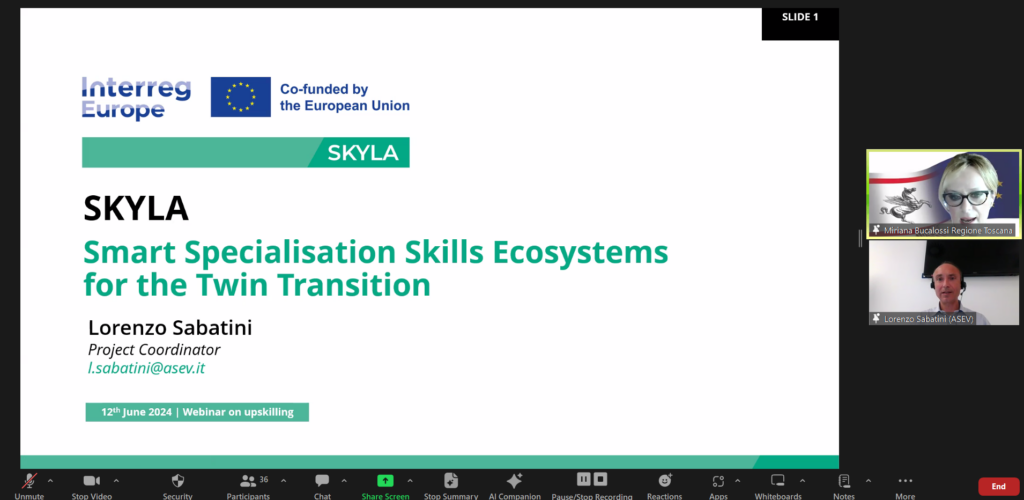Successful webinar on Upskilling for Smart Specialisation Strategies
13/06/2024

On 12 June 2024, EARLALL organised the webinar “Upskilling for Smart Specialisation Strategies” in the framework of the SKYLA – Smart Specialisation Skills Ecosystems for the Twin Transition – Interreg Europe project. The webinar welcomed more than 35 participants to learn from good practices to address skills forecasting and matching at the local and regional levels.
The webinar was opened and moderated by Miriana Bucalossi, Head of Apprenticeships, WBL Policies and EU Project Management Unit, Tuscany Region. Ms Bucalossi elaborated on Tuscany’s commitment to SKYLA, upskilling and developing their vocational education and training in a network of relevant stakeholders. Ms Bucalossi passed the floor to Arnault Morisson, Thematic Experts – Smarter Europe for Interreg Europe Policy Learning Platform. Mr Morrison highlighted the policy learning platform’s role in capacity building and knowledge diffusion and shared examples of their work, including a policy brief on skills for innovation and a webinar on strategic and participatory foresight.
SKYLA – Smart Specialisation Skills Ecosystems for the Twin Transition: Expanding its boundaries
Lorenzo Sabatini, Agency for the development of the Empolese Valdelsa, Project Manager of SKYLA, introduced the project’s main objective of putting future skills at the centre of the twin transitions for a smarter, more resilient development, by boosting and adapting the role of VET in innovation. Mr Sabatini explained how the project originally involved 11 partners, including Tuscany region and associate partner EARLALL, but has expanded to include new partners from the Chamber of Economy Montenegro and the Lviv region in Ukraine.
Mr Sabatini welcomed Vuko Jovanovic and Tanja Radusinovic from the Chamber of Economy of Montenegro and Danylo Petriv and Iryna Tymechko from the Regional Development Agency of Lviv as new partners in the SKYLA Project. Mr Jovanovic highlighted the Chamber’s role in education and quality management, while Mr Petriv outlined the Agency’s mission in promoting regional development and attracting investment. Lorenzo expressed his anticipation in working with both partners in a fruitful cross-border exchange.
Talent4S3 – Retention and attraction of TALENT for a better deployment of Smart Specialisation Strategies
Lucila Castro Rovillard, project manager FUNDECYT – PCTEX from Extremadura, introduced the newly launched TALENT4S3 project. TALENT4S3 is formed of a strong consortium of 6 partner regions and one advisory partner, with a focus on addressing brain drain and talent retention and attraction in line with regional smart specialisation strategies. The TALENT4S3 team will conduct study visits, identify good practices and develop action plans to address challenges. The project’s first step is a state-of-the-art report to clarify each region’s retention and attraction issues. Miriana Bucalossi addressed the participants and asked for their feedback on the projects. Participants expressed their interest in the regional focus of both projects and indicated synergies between them.
Best practices for place-based strategies for upskilling in the twin transition
ITS Academies, Tuscany
Mr Sabatini took the floor to present the ITS Academy system in Tuscany as a successful good practice in skills forecasting and provision. The ITS Academies are structured as foundations formed by private enterprises, training providers and public institutions. The Academies connect with the industry and the region to understand better the needs for the next academic course. The Institutions offer two-year training courses, based on the motto of “learning by doing”, in their courses practical training is essential. The ITS work placements results reveal the success of their model: on average more than 80% of their students find a job after their training.
Innovation and Talent Programme, Extremadura
Ms Rovillard presented an established good practice in the region of Extremadura, a territory characterized by high unemployment rates and a less developed industry sector. The Innovation and Talent Programme was financed by the European Social Fund in the 2014-2020 programming period. It aimed to improve the employability of unemployed young people through integrated training and employment actions. The program offered individuals in targeted sectors (agro-food, ICT, tourism) training in technology centres of the University of Extremadura that was covered by a grant. 525 projects and 651 participants were financed, and 80% of the participants had a contract in the following 12 months. This pilot was expanded into a currently revised version in the region for the 2021-2027 period.
Electric Vehicle and Maintenance program, Baldoyle Training Centre, Fingal
From Fingal County Council Baldoyle Training Centre’s Sharon McCarthy and Aiden Owens presented their new electric vehicle maintenance training program. The training program works to upskill individuals in the maintenance of electric vehicles, with a focus on small and medium-sized enterprises in the Fingal area. The training course, funded by the government’s Skills to Advance program, will involve certification and recognition from the UK’s Institute of Motor Industry. The team discussed the importance of guidance and communication within their policies to support the industry and talent, and the need for future initiatives considering regional and European commission needs.




